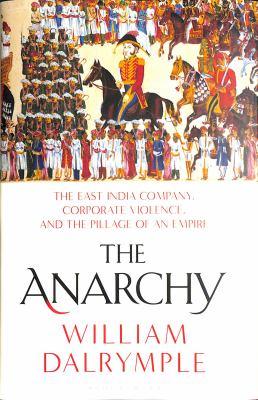
The anarchy : the relentless rise of the East India Company
Available Copies by Location
| Location | |
|---|---|
| Stamford | Available |
Browse Related Items
| Subject |
| East India Company > History. Political corruption > India > History > 18th century. India > Colonization > History > 18th century. |
- ISBN: 9781635573954
- Physical Description xxxv, 522 pages : color illustrations, maps ; 25 cm
- Publisher [Place of publication not identified] : [publisher not identified], 2019.
Content descriptions
| Bibliography, etc. Note: | Includes bibliographical references and index. |
Additional Information

Publishers Weekly Review
The Anarchy
Publishers Weekly
(c) Copyright PWxyz, LLC. All rights reserved
Historian Dalrymple (Koh-i-Noor: The History of the World's Most Infamous Diamond) delivers a sweeping account of the East India Company's conquest of India in this vivid and accessible narrative. Founded in 1599 by a "motley" group of London investors, the joint stock company received a royal charter ambiguous enough to allow its future directors to "claim jurisdiction over all English subjects in Asia," Dalrymple writes. He sketches the East India Company's first 150 years before focusing on the period from 1756 to 1803, when it committed "the supreme act of corporate violence in world history" by seizing control of nearly all of the Indian subcontinent from the Mughal Empire. He traces the conquest's roots to the French and Indian War in North America, and profiles such notable figures as Robert Clive, a former accountant who recruited a private army of Indian soldiers and led them into battle against the nawab of Bengal, and Siraj ud-Daula, a Mughal ally who briefly captured Calcutta in 1757. Dalrymple nimbly chronicles both sides of the ensuing war while never losing sight of just how bizarre and problematic it was for a profit-driven company to become a colonial ruler or create an army. Readers on the lookout for warning signs about the dangers of today's megacorporations will find them in this vibrant, revisionist history. (Sept.)

Kirkus Review
The Anarchy
Kirkus Reviews
Copyright (c) Kirkus Reviews, used with permission.
The often nasty history of the British company that grew to rule India in the 18th century.Veteran historian Dalrymple (Return of a King: The Battle for Afghanistan, 2013, etc.) reminds readers that the Spice Islands, around what is now Indonesia, were a source of lucrative trade, dominated in the 16th century by the Dutch. In 1600, Queen Elizabeth granted envious British merchants a monopoly in the region. Ships of the fledgling East India Company made some profitable voyages, but the Dutch defended their territory violently. Consequently, Britons turned their attention to India, then an open market mostly ruled by the Mughal Empire, considered the wealthiest in the world. The EIC established thriving trading settlements along the coast and respected Mughal authority. Matters changed after 1707, when the last competent ruler died and the empire dissolved into chaos and war between ambitious men and principalities. This was no secret to the EIC, which began training its own armies and expanding its influence by taking sides. Perhaps the key event was the pugnacious Robert Clive's 1757 victory at the Battle of Plassey, which gave the company control of Bengal, the richest province in India. The result, as characterized in Dalrymple's unsparing account, was a feeding frenzy in which fortune-seeking Britons forcibly ejected native merchants and landowners, took over tax collection, and literally stripped the land bare. In 1770, Bengal suffered its first disastrous famine, and others followed. The author diligently recounts decades of violence ("the Anarchy") that followed, ending just after 1800 with the defeat of the last local Indian potentate. "In less than fifty years," writes Dalrymple, "a multinational corporation had seized control of almost all of what had once been Mughal India. The author concludes gloomily that the EIC has no exact modern equivalent, but Walmart, Apple, and other massive corporations do not need their own armies; governments are happy to protect their interests.A depressing but expert account of the rise of the first great multinational corporation. Copyright Kirkus Reviews, used with permission.


